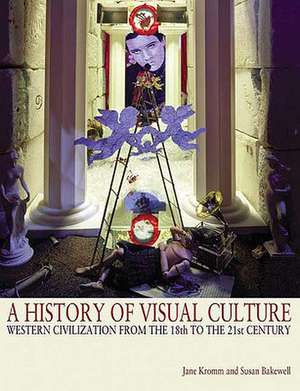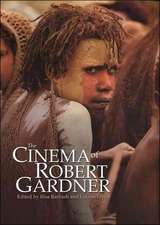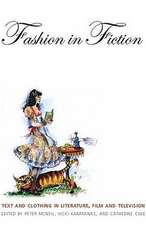A History of Visual Culture: Western Civilization from the 18th to the 21st Century
Editat de Jane Kromm, Susan Benforado Bakewellen Limba Engleză Paperback – 30 noi 2009
| Toate formatele și edițiile | Preț | Express |
|---|---|---|
| Paperback (1) | 272.81 lei 6-8 săpt. | |
| Bloomsbury Publishing – 30 noi 2009 | 272.81 lei 6-8 săpt. | |
| Hardback (1) | 336.48 lei 6-8 săpt. | |
| Bloomsbury Publishing – 30 noi 2009 | 336.48 lei 6-8 săpt. |
Preț: 272.81 lei
Preț vechi: 325.85 lei
-16% Nou
Puncte Express: 409
Preț estimativ în valută:
52.20€ • 54.65$ • 43.19£
52.20€ • 54.65$ • 43.19£
Carte tipărită la comandă
Livrare economică 05-19 aprilie
Preluare comenzi: 021 569.72.76
Specificații
ISBN-13: 9781845204921
ISBN-10: 1845204921
Pagini: 416
Ilustrații: 120 bw illus
Dimensiuni: 189 x 246 x 28 mm
Greutate: 0.79 kg
Ediția:English.
Editura: Bloomsbury Publishing
Colecția Berg Publishers
Locul publicării:London, United Kingdom
ISBN-10: 1845204921
Pagini: 416
Ilustrații: 120 bw illus
Dimensiuni: 189 x 246 x 28 mm
Greutate: 0.79 kg
Ediția:English.
Editura: Bloomsbury Publishing
Colecția Berg Publishers
Locul publicării:London, United Kingdom
Caracteristici
Also available in hardback, 9781845204938 £65.00 (December, 2009)
Notă biografică
Jane Kromm is Professor of Art History at Purchase College, State University of New York and author of The Art of Frenzy: Public Madness in the Visual Culture of Europe, 1500-1850. Susan Benforado Bakewell is an independent curator and scholar, and has taught at the University of Texas, Arlington and Southern Methodist University. She is co-editor of Voices in New Mexico Art.
Cuprins
General Introduction Jane KrommPart One: Revolt and RevolutionIntroduction1: Helen Weston, 'The Politics of Visibility in Revolutionary France: Projecting on the Streets'2: Richard Taws, '19th c. Revolutions and Strategies of Visual Persuasion'3: Elizabeth Guffey, 'Socialist Movements and the Development of the Political Poster'4: Jelena Stojanoviæ, 'Avant-gardes and the Culture of Protest: The Use-Value of Iconoclasm'Part Two: Science and EmpiricismIntroduction5: Jane Kromm, 'To Collect is to Quantify and Describe: Visual Practices in the Development of Modern Science'6: Fae Brauer, 'The Transparent Body: Biocultures of Evolution, Eugenics, and Scientific Racism'7: Heather McPherson, 'Biology and Crime: Degeneracy and the Visual Trace'8: Nancy Anderson, 'Visual Models and Scientific Breakthroughs; The Virus and the Geodesic Dome: Pattern, Production, Abstraction and the Ready-Made Model'Part Three: Gaze and SpectacleIntroduction9: Temma Balducci, 'Gaze, Body and Sexuality: Modern Rituals of Looking and Being Looked at'10: Jane Kromm, 'The Flâneur/Flâneuse Phenomenon'11: Elana Shapira, 'Gaze and Spectacle in the Calibration of Class and Gender: Visual Culture in Vienna 1900'12: Fae Brauer, 'The Stigmata of Abjection: Degenerate Limbs, Hysterical Skin and the Tattooed Body'Part Four: Acquisition, Display, and DesireIntroduction13: Jane Kromm, 'To the Arcade: The World of the Shop and the Store'14: Amy Ogata, '"To See is to Know:" Visual Knowledge at the International Expositions'15: Susan Bakewell, 'Changing Museum Spaces: From the Prado to the Guggenheim Bilbao'16: Michael Golec, 'Design for a Display Culture: Domestic Engineering to Design Research'Part Five: Conquest, Colonialism, and GlobalizationIntroduction17: Matthew Potter, 'Orientalism and its Visual Regimes: Lovis Corinth and Imperialism in the Art of the Kaiserreich'18: Marcus Wood, 'Marketing the Slave Trade: Slavery, Photography and Emancipation'19: Kim Masteller, 'Cultures of Confiscation: The Collection, Appropriation and Destruction of South Asian Art'20: Nada Shabout, 'Trading Cultures: The Boundary Issues of Globalization'Part Six: Image and RealityIntroduction21: Joy Sperling, 'Multiples and Reproductions: Prints and Photographs in 19th c. England; Visual Communities, Cultures, and Class'22: Jane Kromm, 'Inventing the Mise-en-scène: German Expressionism and the Silent Film Set' 23: Sarah Warren, 'The Reality of the Abstract Image: Re-thinking Spirituality in Abstraction'Part Seven: Media and Visual TechnologiesIntroduction24: Brenda DeMartini-Squires, 'Now You See It: Disinformation and Disorientation on the Internet'25: Kathryn Shields, 'Carnival Mirrors: The Hermetic World of the Music Video'26: Matt Ferranto, 'Digital Self-fashioning in Cyberspace: The New Digital Self-Portrait'27A: Martin Danahay, 'Video Games: Art, Cinema and Interactivity'27B: Chris Kaczmarek, 'What You See is What You Get, or Reality is What you Take From It'
Recenzii
This is the only treatment of visual culture with a broad temporal reach across a range of Western art practices that emphasizes the historical specificity of the visual experience. The approach - to highlight the key themes in visual culture and to illustrate these themes chronologically through carefully chosen case studies - is very effective.
Solid, scholarly writing that would be suitable, in many cases revelatory, for students at any level of college as well as established art and art history scholars, curators and those in many other historical disciplines.
Overall, A History of Visual Culture is a solid introductory reader. The essays are short, assume no conversancy in social or media theory and consistently make use of fresh visual examples.
Solid, scholarly writing that would be suitable, in many cases revelatory, for students at any level of college as well as established art and art history scholars, curators and those in many other historical disciplines.
Overall, A History of Visual Culture is a solid introductory reader. The essays are short, assume no conversancy in social or media theory and consistently make use of fresh visual examples.











